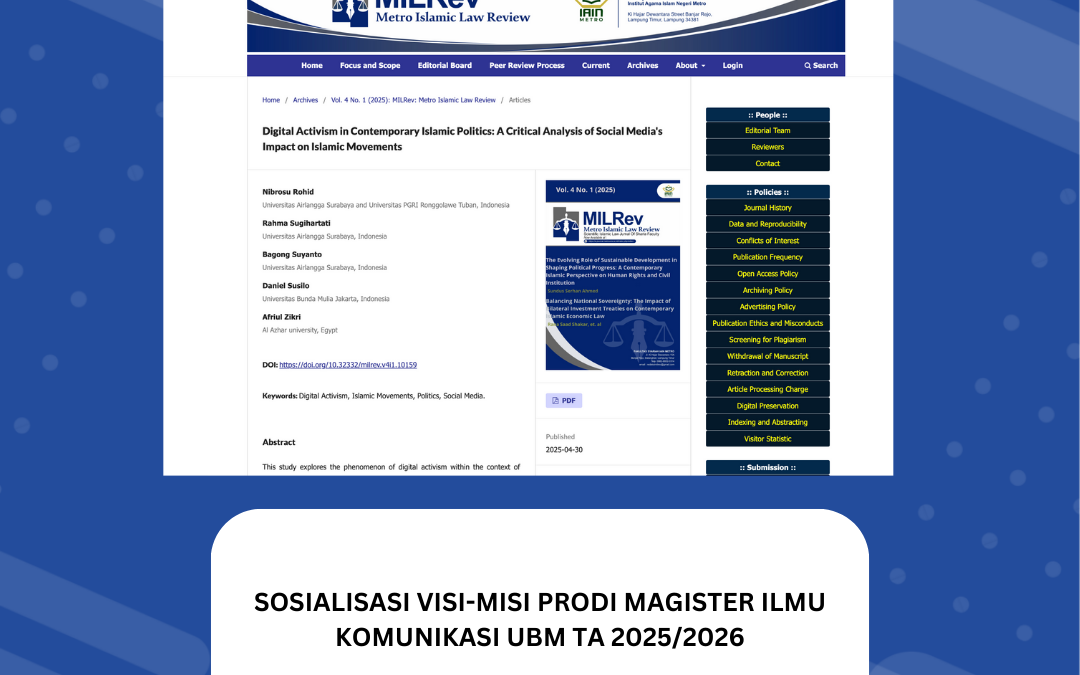Media Sosial dan Aktivisme Digital: Wajah Baru Politik Islam di Indonesia
Jakarta, 30 April 2025 – Sebuah penelitian terbaru mengungkap transformasi signifikan dalam politik Islam di Indonesia melalui kehadiran aktivisme digital. Studi ini menyoroti bagaimana media sosial menjadi ruang baru bagi mobilisasi politik dan wacana keagamaan di tengah dinamika pergerakan Islam kontemporer. Penelitian yang menggunakan pendekatan kualitatif ini menganalisis konten, strategi, serta dampak penggunaan media sosial oleh berbagai kelompok Islam, baik yang moderat maupun konservatif. Hasil studi menunjukkan bahwa media sosial tidak hanya berfungsi sebagai alat komunikasi, tetapi juga sebagai ruang diskursif dalam membentuk identitas, menyampaikan narasi politik, dan menggerakkan aksi kolektif. Media sosial telah menjadi katalis dalam pembentukan identitas politik Islam dan memperkuat dukungan massa. Namun, di balik manfaatnya, penggunaan media sosial juga membawa tantangan serius, seperti polarisasi masyarakat, penyebaran informasi yang menyesatkan, hingga potensi radikalisasi. Oleh karena itu, studi ini menekankan pentingnya memahami dampak aktivisme digital dalam konteks sosial, politik, dan budaya yang lebih luas. Penelitian ini memperkaya kajian politik Islam kontemporer dan transformasi digital, khususnya di negara demokrasi non-Barat seperti Indonesia. Dengan mengkaji peran media sosial dalam mendorong perubahan politik di lingkungan keagamaan, studi ini memberikan perspektif baru tentang pertemuan antara agama dan teknologi digital.
Adapun abstrak penelitian ini yaitu,
“This study explores the phenomenon of digital activism within the context of contemporary Islamic politics in Indonesia, focusing on the influence of social media on the dynamics of Islamic movements. Social media has emerged as a new space for political mobilization and religious discourse, enabling Islamic groups to expand their reach, enhance participation, and consolidate support. The study employs a qualitative approach with a critical analysis of the content, strategies, and impacts of social media use by various Islamic movements, ranging from moderate to conservative. The findings reveal that social media serves as a communication tool and a discursive space for shaping identities, conveying political narratives, and mobilizing collective action. On the other hand, the use of social media by Islamic movements also presents challenges, including polarization, misinformation, and the potential for radicalization. The research highlights that digital activism has reshaped the landscape of Islamic politics in Indonesia, with social media as a key catalyst for this transformation. However, its impact must be critically understood within broader social, political, and cultural contexts. These findings significantly contribute to studying Islamic politics and digital transformation in the modern era. The research expands academic literature on contemporary Islamic politics by analyzing the role of social media as a tool for political transformation within Islamic movements in Indonesia. This study offers a fresh perspective on the intersection of religion and digital technology, emphasizing how social media shapes political identity, mobilizes support, and influences public discourse and policy. Academically, this research contributes by providing a nuanced understanding of the digitalization of religious, political movements in a non-Western democratic context, enriching comparative studies on digital activism and political Islam.”
Link publikasi : https://e-journal.metrouniv.ac.id/milrev/article/view/10159


